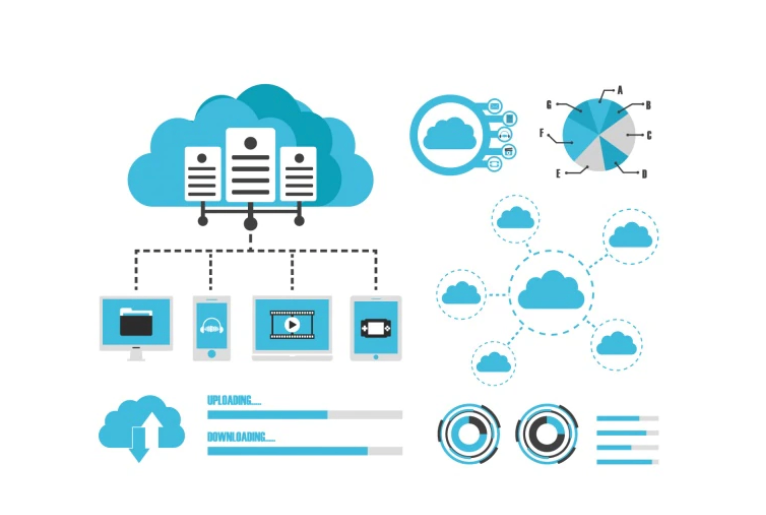In today’s data-driven businesses, huge quantities of data are captured from various sources. This data volume poses challenges and opportunities that data scientists must tackle. Data scientists require strong computing resources and flexible storage solutions to analyze and extract insights from this information effectively. We can now turn to cloud computing to solve this problem.
Cloud computing is now an indispensable tool for data scientists, helping them reap the advantages of scalability, flexibility, and accessibility. The article will examine why cloud computing will be crucial for data scientists in 2024. We will also explore how data scientists can utilize cloud computing to tackle business issues.
Cloud Computing and Data Science
Cloud computing provides computing services such as databases, servers, storage, networking, analytics, and the internet. It permits individuals and businesses to use and access the resources on a pay-as-you-go basis without managing or owning physical hardware. For data researchers, cloud computing offers the ability to work in a centralized environment, in which they can carry out various tasks that involve data storage, processing, and analysis.
Data scientists are faced with massive quantities of data, and the storage and management of the vast amounts of data can pose an enormous challenge. Traditional storage systems on premises may need help to handle the volume or the scalability needed to handle massive datasets. Cloud platforms can provide flexible storage solutions like the data lake and warehouse, where data scientists can safely keep and manage data. Cloud-based storage solutions allow changing the changing data requirements and managing massive amounts of data.
Exploring the relationship between data science and cloud computing reveals an intricate symbiotic bond that will shape future analytics efforts. Professionals looking to master data have many opportunities available through enrolling in comprehensive “Data Science Courses.” Still, cloud computing plays an integral part in this landscape and should also be taken seriously as an option for their education. Hyderabad is an innovative hub; tailored data science course in Hyderabad could offer local industry-specific insights.
The data science course introduces students to the fundamentals of data science – such as statistical analysis and machine learning – and stresses their seamless integration into cloud computing technologies. As more organizations rely on flexible computing resources, mastery of Data Science services and cloud computing is becoming essential. Make sure your course addresses this interdependence to ensure you can drive innovation in this dynamic intersection of technologies.
What makes cloud computing a crucial part of data science?
Scalability and Flexibility
One main benefit of cloud computing to data scientists is its scalability. Cloud computing platforms permit data scientists to expand their computing resources up and down to their needs. This is crucial in the case of large data sets or running algorithms that require a lot of computational power. In traditional on-premises infrastructure, scaling resources can prove slow and costly. However, cloud platforms allow you to provide additional resources at any time to ensure researchers with data science have the computing power to tackle difficult tasks in data analysis.
Cost-Effectiveness
Cloud computing is also affordable, especially for researchers who work in data science. Companies must invest in software, hardware, and maintenance in traditional on-premise infrastructure. The upfront costs are important, especially for medium or small-sized companies. Cloud platforms operate under the pay-as-you-go principle, meaning users only pay for resources they use.
This means there is no requirement for initial investments and lets data scientists match their computing costs to their use. Cloud platforms also offer cost-optimization features, including auto-scaling and resource allocation, to reduce costs further.
Data Processing and Analytics
Data scientists typically require preprocessing and transforming data before performing analysis or preparing models for machine learning. Cloud platforms can provide data processing and analytics tools, allowing data scientists to complete these tasks quickly.
These tools use the power of distributed computing and parallel processing capabilities to handle huge amounts of data and speed up processing tasks. Data scientists can use these cloud-based tools to cleanse and transform data, resulting in important insights and concrete recommendations.
Machine Capabilities for Learning
Machine learning is an essential aspect of data science, and cloud platforms can provide an array of frameworks and services for machine learning. These platforms offer pre-built algorithms, high-performance GPUs, and computational capabilities distributed across the globe that permit data scientists to create, train, and implement large-scale machine-learning models.
Cloud-based machine learning tools make it easier to complete model development and deployment, allowing data scientists to concentrate on the most important aspects of their job, like modeling evaluation and feature engineering.
Real-Time Data Analysis
Cloud computing allows data scientists to analyze and make decisions in real-time data. Traditional on-premises infrastructure may not effectively handle streaming data in real-time. Cloud platforms provide the infrastructure and tools for processing and analyzing real-time data.
This allows data scientists to create real-time recommender systems, carry out sentiment analysis of Twitter feeds, and detect irregular data stream irregularities. Data analysis in real-time allows data scientists to make decisions based on data in a constantly changing environment.
ExcelR – Data Science, Data Analytics and Business Analyst Course Training in Hyderabad
Address: Cyber Towers, PHASE-2, 5th Floor, Quadrant-2, HITEC City, Hyderabad, Telangana 500081
Phone: 096321 56744




